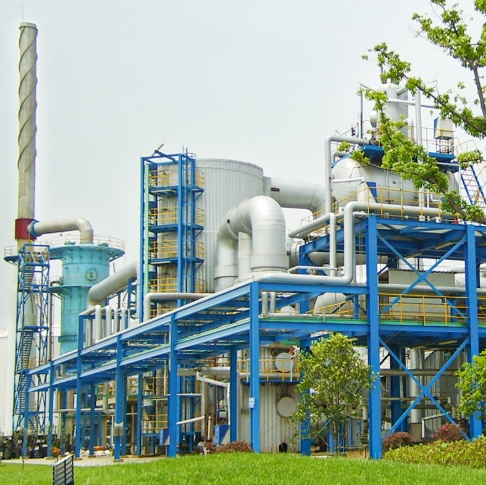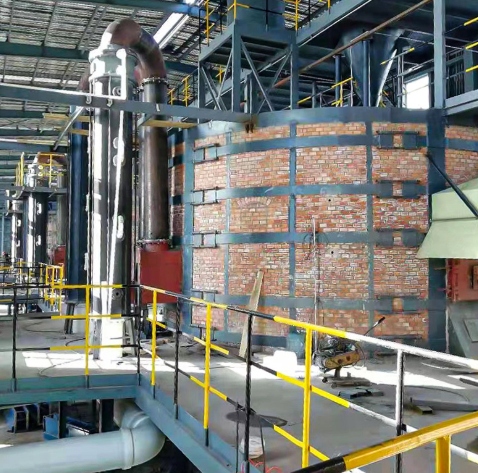
Advantages in Efficiency and Productivity
Streamlining the Manufacturing Process
The production line is optimized for manufacturing processes around the potassium/sodium sulfate production to ensure smooth and effective operations. Aoliande has built up different production lines based on product categories, such as Mannheim process potassium sulfate chemical equipment, all kinds of GRP products production lines, and so on. This systematic approach allows for high precision and consistency of operations within the factory automation. With the introduction of advanced technologies, including PLC automatic control systems, such tasks as feedstock ratio adjustments can be automated, reducing human error whilst increasing reliability and efficiency. Gas generators and new furnace designs used for your energy conversion complement the utilization of your energy.
Reducing Production Time and Costs
A potassium/sodium sulfate production line, as the name indicates, does not only mean producing a large quantity of potassium/sodium sulfate , but a highly efficient production line can save a lot of time and money through higher production rates. Incorporating new designs, and better flue designs in the furnace, minimizes energy consumption while also ensuring that the reaction goes to completion during the process of manufacturing. Apart from this, waste recovery systems recover hydrochloric acid (HCl) fulfill environmental requirements, and help to reduce material costs [6]. All these innovations foster an operation that produces much for little.
Enhancing Output Quality and Consistency
Potassium sodium sulfate production line output is a high-quality feature. Some key parts of the equipment are made of special material that is not easily corroded and features durability, providing long service life and consistent quality of the product. Advanced HCl absorption systems result in excellent absorption performance, which in turn improves the quality of the final product. Further, its unique materials and technology keep the heating uniform in the furnace, enabling homogenous reactions and thereby, a consistency in product standards.

Environmental and Sustainability Benefits
Minimizing Waste in the Production Process
Environmental sustainability, modern industrial practices. As for waste generation, the potassium/sodium sulfate production line incorporated systems for the recovery of many types of wastes, such as the recovery of waste hydrochloric acid, which can be reused within the manufacturing plant. This practice not only complies with legal environmental guidelines but also results in less resource waste and a step towards sustainable manufacturing. It reduces resource wastage and leads to sustainable manufacturing, which is in line with environmental regulations.
Energy Efficiency in Modern Production Lines
This production line is designed for energy efficiency. The latest furnace designs ensure energy is used most effectively by delivering uniform heat during the process. This trend in the use of gas generators as heat sources helps to decrease dependence on conventional energy resources and reduces total energy consumption. Thanks to these innovations, this production line represents a sustainable solution for mass production.
Supporting Sustainable Industrial Practices
We design or produce the potassium/sodium sulfate production line with an innovative idea and conducting principles that support the sustainability of the industry. The method eliminates pollution problems effectively by solving environmental problems caused by hydrochloric acid absorption and adopting dust-free feeding methods. Such actions are committed to both sustainability and high productivity. These steps reflect a commitment to sustainability while also ensuring a high productivity level.
Economic Benefits for Businesses
Cost-Effectiveness of Large-Scale Production
One key benefit provided by this production line is its economic viability. At Aoliande factory in Inner Mongolia, the annual output capacity is up to 160 thousand tons of potassium sulfate and 200 thousand tons of high-quality hydrochloric acid, with which famous enterprises can form a scale benefit. By having the capacity to produce products on a large scale, companies can respond to market demand quickly, and naturally reduce costs as well.
Opportunities for Market Expansion and Growth
This production line, integrated with advanced technology, will provide us with more market expanse. Aoliande is based not only on the product provider but also a landscape EPC project services with FEA (material, structure, design), providing technical consultation and installation supervising services around the world. This is end-to-end support that empowers businesses to start business operations across the globe with confidence.
Competitive Advantage Through Advanced Technology
Integration of best-in-class technology gives businesses a leading edge over others in the industry. Functions such as PLC automatic control systems are making it more stable and easy to operate. In addition, Aoliande is dedicated to continuously developing advanced technology and stability through constant professional research, making its goods find the best tech equilibrium. In addition, Aoliande continued to develop through professional research, so its products are always cutting-edge technology.
Investing in a potassium/sodium sulfate production line from Aoliande will give you the best efficiency, sustainability, and economic benefits, and make your contribution to environmental living comfortable as a whole.
Applications of Potassium/Sodium Sulfate Products
Agricultural Uses in Fertilizers
The agricultural industry heavily relies on potassium/sodium sulfate products. These compounds commonly act as fertilizers because of their high concentrations of potassium, an essential nutrient for plant growth and development. Potassium sulfate, especially, is beneficial for yield and quality without the contributing negative chloride effect for some crops. Water-soluble fertilizers, especially those made with specific production processes, go into an entirely dissolved state in water and are then readily taken in through plant roots and plant foliage. Ensuring quick nutrient availability makes them perfect for effective application in high-yielding crops during the vegetative growth phase.
This fertilizer production line is equipped with intelligent batching and mixing systems. Take Aoliande for instance, Aoliande water-soluble fertilizer production line consists of materials feeding, batching, mixing, and packing that is effective in formulation accuracy and nutrient equality. This accuracy makes fertilizers more effective and reduces wastage. This increased accuracy improves fertilizer efficiency and reduces wastage.
Industrial Applications Across Various Sectors
Potassium/sodium sulfate products are also used in a wide range of industrial applications besides agriculture. Their stability, especially in an aqueous solution, coupled with their efficiency as intermediates, renders them useful in the manufacture of glass, detergents, and dyes. Sodium sulfate, when used in the textile industry, acts as a leveling agent in dyeing processes allowing the dye to distribute evenly across the fabric.
The GRP products and equipment of Aoliande are used in food brewing, seawater desalination, power plant desulfurization, titanium dioxide production, metallurgy, waste gas treatment, and urban water supply. These compounds are useful in many industries, demonstrating versatility. The diversity of these compounds highlights their significance in different industries.
Importance in Pharmaceutical and Food Industries
Potassium/sodium sulfate products are also important for pharmaceutical and food applications. In pharmacological industries, they are used as excipients in drug formulations to improve the stability and availability of drugs. In foods, they are used as additives or processing aids to enhance texture or preservation. These compounds serve as a food additive or food processing aid for texture or preservation in the food industry.
These chemicals are produced using advanced production technologies at Aoliande to meet the high-quality requirements desired for pharmaceutical and food-grade applications. The company is certified with the ISO9001 management system, demonstrating its focus on quality. ISO9001 management system certification, which assures the quality of the company
Technological Innovations in Production Lines
Automation and Smart Systems Integration
Lines for modern production of potassium/sodium sulfate utilize automated processes and can be run with a minimal number of personnel. Aoliande uses a PLC auto-control system, which can adjust the feedstuff ratio with high accuracy. This minimizes manual intervention, thus improving operational efficiency. Smart systems also facilitate the monitoring of production processes in real-time and ensure quality output. Finally, real-time monitoring capabilities offered by smart systems result in a standardized quality output in the production processes.
Automation not only improves productivity but also reduces labor costs by minimizing manual intervention. This makes the production process more cost-effective for manufacturers.
Role of Advanced Equipment in Improving Processes
Enhanced performance in production processes is abetted, in large part, by the incorporation of sophisticated equipment. The core of Aoliande potassium/sodium sulfate equipment is made of special anti-corrosive materials, which makes it long-lasting. These features make the tools last longer and keep running optimally These features are responsible for offering durability and long-lasting performance to the types of machinery.
Innovative furnace designs are another highlight of modern production lines. For instance, Aoliande has improved flue designs within furnaces to achieve even heating and complete chemical reactions. Such advancements result in higher energy efficiency and better product quality.
Future Trends in Potassium/Sodium Sulfate Production
The outlook for traditional potassium/sodium sulfate appears to be mostly the development of more efficient production technologies and more sustainable production solutions. Firms such as Aoliande are integrating greener attributes into their manufacturing lines. Such as recycling hydrochloric acid (HCl) using waste recovery systems, which will tackle environmental issues and save material costs as well. For illustration, waste recovery systems recycle hydrochloric acid (HCl) to mitigate environmental issues and reduce material expenses.
New trends are building renewable energy-based heating processes and eco-friendly equipment material development. These innovations are in sync with global sustainability efforts but sustainable large-scale production is also achieved. These innovations fit well into global initiatives for sustainability, and at the same time, also are suited to mass production with efficiency.

FAQ
Q: What are the cost drivers for potassium/sodium sulfate production?
A: There are various factors that affect the production cost of potassium/sodium sulfate. The price of raw materials is vital; for example, MOP (muriate of potash) and sulphuric acid can be expensive. While the Mannheim Process is the only large-scale process for the production of ammonium nitrate, it has high input costs due to the need for pure raw materials. The well-established Mannheim Process comes along with high input costs since it requires such raw materials[12][13].
Energy consumption is another major cost driver. Advanced furnace designs that optimize energy use can help reduce overall expenses. Additionally, automation technologies lower labor costs by streamlining operations.
Q: How is quality control ensured in potassium/sodium sulfate production?
A: Quality control is paramount in potassium/sodium sulfate production to meet industry standards and customer expectations. Aoliande ensures quality through rigorous adherence to ISO9001 certification requirements. Advanced HCl absorption systems enhance product purity by improving absorption efficiency.
Another solution that helps ensure consistent quality during the manufacturing process is automated monitoring systems. Through technology and expertise, manufacturers are able to provide the world with high-quality products that cater to various application requirements. Utilizing and harnessing tech and expertise, manufacturers worldwide can produce the right quality product to serve various applications.





